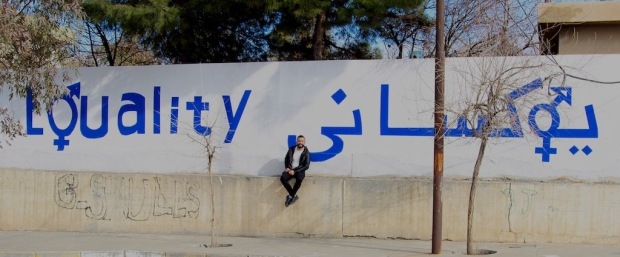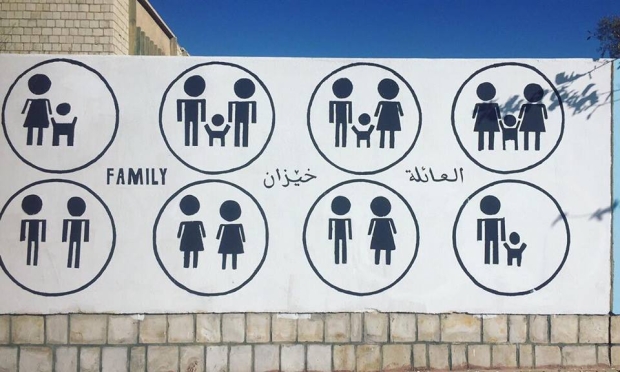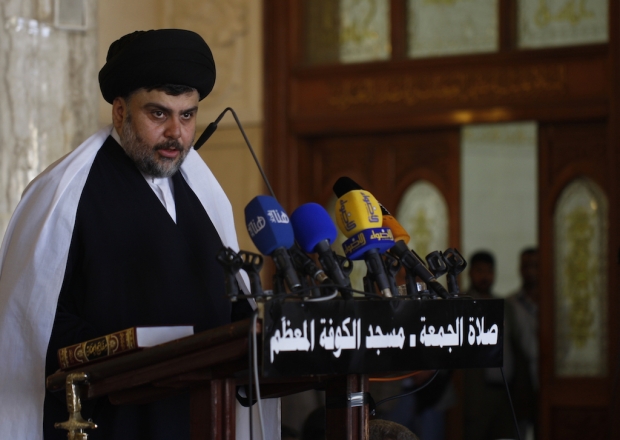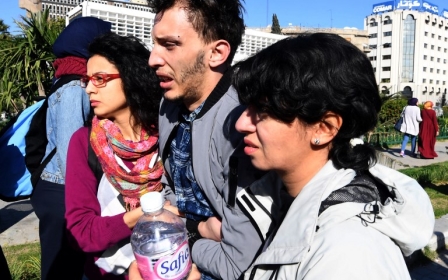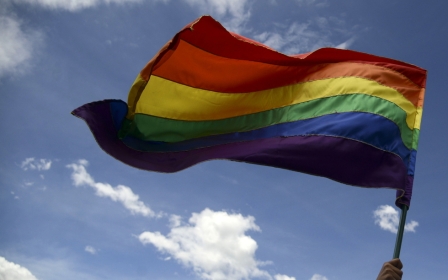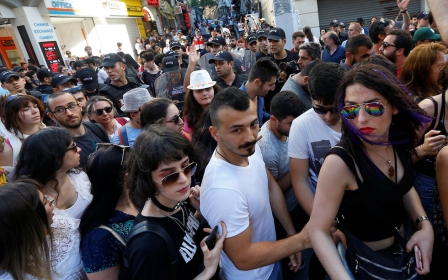'The world is changing': Iraqi LGBT group takes campaign to streets
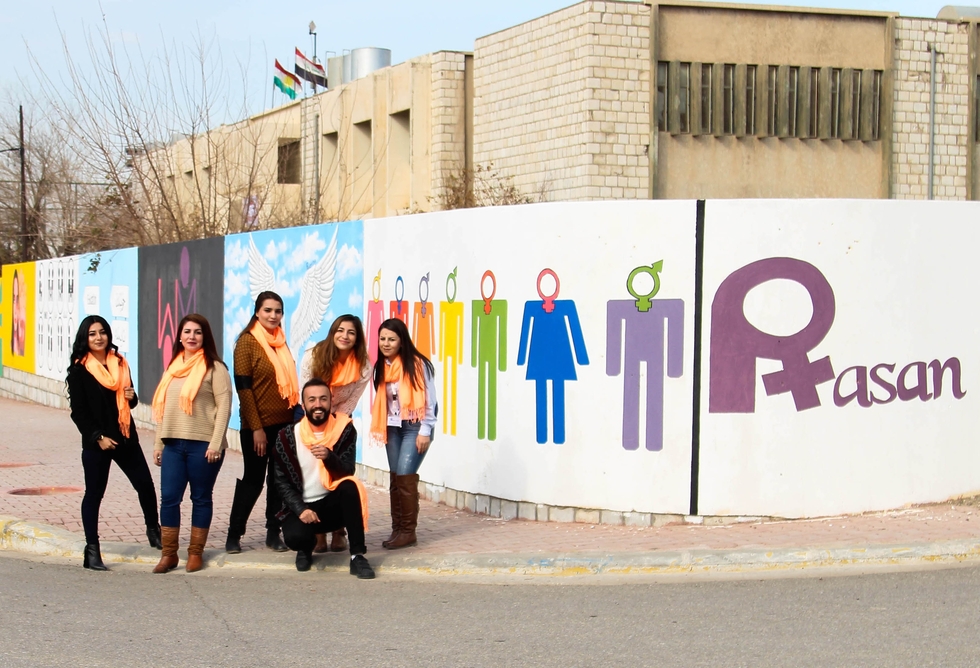
Few would argue that Iraq is a haven for LGBT rights, even though homosexuality is not officially criminalised - unlike many other countries in the Middle East - and open discussion around sexual difference is both rare and discouraged.
However, a group of activists in the northern city of Sulaymaniyah have set out to challenge the idea that gay, lesbian, bisexual and trans issues should not be discussed or are not relevant to their communities.
The human rights organisation Rasan is set to cover the walls of their city in new murals, designed to raise awareness of the rights of LGBT people and encourage dialogue within their mainly Sunni Kurdish society.
The plan, said Rasan's deputy director Ayaz Shalal, was to strategically place the murals near the entrance of the city so "everyone who comes to the city and leaves the city will see these murals". The group also plans to release online educational animations to coincide with the campaign, which will launch at the beginning of April.
It is not the first action of this nature they have engaged in, but it is the largest in scale so far, an indication, said Shalal, that attitudes are changing for the better.
"With these kinds of murals we are saying to people: 'This is not wrong and if you want to know more, we will tell you'," he told Middle East Eye.
"We are spreading ideas in the community. We don't go on the streets and scream; we don't just go on the TV and have random shows on LGBT [issues], because that's not how you raise awareness.
"If the advice comes from someone close to you, you will receive it better ... than if it comes from a public figure."
Originally founded in 2004 as an organisation focusing primarily on women's rights, Rasan eventually adopted LGBTQI (adding queer and intersex) rights under its remit.
[Rasan] currently has two imams who are involved with us and they are working on releasing fatwas in support of LGBT
- Ayaz Shalal, Rasan deputy director
Previously, Rasan painted the walls of schools in Sulaymaniyah with pro-LGBT murals, hoping to spread ideas to the younger generation.
And while that sort of action might be expected to provoke a pushback in some places, Shalal argues that Rasan has been successful in building a reputation and creating a community network that accepts their campaigning, even if not everyone fully accepts their ideas.
"People trust us," he said, adding that in their first workshop launched last year, the majority of those who initially attended stayed to completion. "Some people left, but some people stayed."
He said Rasan reached out to community leaders and had managed to corral a support base that included members of the Kurdistan Regional Government's (KRG) Ministry of Education, lawyers, doctors and religious figures.
He added that Rasan "currently has two imams who are involved with us and they are working on releasing fatwas in support of LGBT".
The group's activism has, however, highlighted a stark contrast in attitudes to LGBT issues across Iraq, as well as the ability of campaigners to publicly raise them.
Notably, Rasan has been given permission to carry out their mural campaign by local government authorities in Sulaymaniyah.
The city has long held a reputation as the most socially liberal city in Iraq and, while LGBT individuals still face much social pressure, there is a space that does not exist in other parts of the country.
"Even if you compare the situation of LGBTs themselves, it's better and safer in Kurdistan. So many people just run away from the rest of the cities and they come to the north because it’s safer," said Shalal. "That doesn’t mean it’s safe. At all. But it’s safer.
"Compared to the rest of Iraq, they don’t get their heads smashed in the street."
A 'safe place'
The most well documented and virulent recent cases of violence against LGBT people in Iraq were the executions carried out in areas controlled by the Islamic State group.
Images of gay men being thrown from buildings in Mosul filtered into the media, another addition to the litany of abuses carried out by the group.
But the other primary source of violence against LGBT people in Iraq has stemmed from the same people who took most credit for defeating IS.
Although homosexuality was illegal under Saddam Hussein, his overthrow by the US-led invasion in 2003 has seen the growth of armed groups with financial and ideological links to the Islamic Republic of Iran, a country responsible for more than 5,000 executions of LGBT people since 1979.
According to human rights organisations, the armed groups have harassed and attacked LGBT people (or those perceived to be LGBT) and in at least one instance in 2014 the Asa'ib Ahl al-Haq organisation released a wanted list with the names of suspect gay men.
In 2012, armed groups, primarily in Baghdad, started a campaign against people perceived to be "emo," referring to usually young men perceived to be effeminate and sexually ambiguous. The UN Assistance Mission for Iraq reported that around 56 people were murdered for being "emo" as a result.
And in 2017, an actor was stabbed and tortured to death in Baghdad for "looking gay," according to local media reports.
Despite the difficulties that LGBT people face, both Rasan and other pro-LGBT groups such as IraQueer have managed to establish small networks and hold (usually clandestine) meetings where LGBT Iraqis can discuss their sexuality.
"The biggest thing you need for any meeting of LGBT people is a safe place," one Iraqi, who wished to remain anonymous, told MEE.
"At the moment it is very difficult to find a place for such meetings, because of the dangerous situation in Iraq at the moment.
After my family found out about my orientation my father spilled by blood. I was forced to leave my family, my city and my work. I had to leave everything just to save my life
- Anonymous
"Because of this, we hold small meetings from time to time. They are held in private locations far from either the militias or the state."
Despite the hostility they often face, he said that they usually managed to attact a reasonable number of both LGBT and non-LGBT people who were interested in the issue.
"The majority of people attending these meetings have previously been persecuted in our society. There are also some secularists and allies of LGBT people, especially Communists," he said.
"Someone who is gay can’t be open about it to his family – in the eyes of his family, this would mean that he has brought shame on them," he added.
"Because of this, they would want to get rid of him, especially if they are conservative and from a tribal background. This is what happened to me.
"After my family found out about my orientation my father spilled by blood. I was forced to leave my family, my city and my work. I had to leave everything just to save my life."
Campaigners have hailed some improvements.
The influential Shia cleric Muqtada al-Sadr, who also recently made headlines for his opposition to sectarianism and his alliance with the secular Communist party, announced in 2016 that it was unnacceptable to attack people suspected of homosexuality.
Although he reiterated the need for Iraqis to "disassociate" themselves from LGBT people, he emphasised that they must "not attack them, as it increases their aversion, and you must guide them using acceptable and rational means".
IraQueer and Human Rights Watch welcomed his words, though noting that they did not go far enough.
"Finally, the head of one of the groups whose members have carried out serious abuses against lesbian, gay, bisexual and transgender (LGBT) people in Iraq is condemning these heinous attacks," said Joe Stork, then deputy Middle East director of HRW.
"We hope this will change behaviour in successors to [Sadr's militia] the Mahdi Army and other ranks, and spur the government to hold accountable those who commit these crimes."
Few people expect the upcoming May parliamentary elections to signal any real social change in Iraq, let alone for LGBT rights.
Even political parties that might otherwise be supportive of LGBT rights are unlikely to campaign on an issue which will alienate so many people.
In the KRG, which saw much of its autonomy collapse in 2017 after an ill-fated independence referendum, a collapsing economy and political in-fighting take centre stage over social issues.
In spite of this grim picture, Shalal remains optimistic that history is on his side.
"The reason that we got support [from Sulemaniyah] is because we proved to people, day-by-day, that what we are doing is right. Our allies are increasing. LGBT people are being more visible," he said
"The world is changing, it’s being more open and everything is going towards our interests."
This article is available in French on Middle East Eye French edition.
New MEE newsletter: Jerusalem Dispatch
Sign up to get the latest insights and analysis on Israel-Palestine, alongside Turkey Unpacked and other MEE newsletters
Middle East Eye delivers independent and unrivalled coverage and analysis of the Middle East, North Africa and beyond. To learn more about republishing this content and the associated fees, please fill out this form. More about MEE can be found here.


